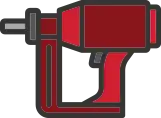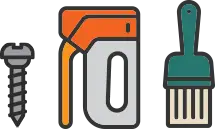

 world-class
world-class
 business
business

 problem solver
problem solver

Lindner’s experiential learning toolbox empowers students to tackle real-world problems, learning-by-doing and putting theory into practice through:
- Simulations, classroom projects and student-managed funds.
- Co-curricular experiences, case competitions and engagements with Lindner’s centers and institutes.
- Co-op, UC’s gold standard for experiential learning.
The results: students recognize their potential, elevate their skills, and build their resumes, networks and confidence.

For one semester, Grace Deppert, BBA ’24, operated a Benihana, a popular hibachi restaurant chain. But Deppert never stepped foot inside the restaurant.
“It was helpful to use simulations, because we could experience a new type of business and a new industry and a new concept every single week. And with every single new assignment, that helped us apply it, because we could see it play out in real time and we could manipulate variables that we couldn't manipulate if we were, say, an intern.”
Through OM5085: Operations Strategy, Deppert partook in a unique digital simulation that challenged students’ problem-solving abilities. These hands-on learning opportunities magnify the secret formula behind the value and power of a degree from Lindner: experiential learning.
“For students to truly appreciate the value and limitations of theories and management best practices, they need to apply them in ambiguous, messy, unpredictable business environments,” said Jaime Windeler, PhD, associate dean of undergraduate programs and student experience, and an associate professor of information systems. “Our approach challenges students to obtain, apply and reflect on core business concepts. Lindner’s commitment to experiential learning only furthers our reputation as a leading business school that cultivates well-rounded, career-ready graduates.”

Experiential learning strengthens students’ engagement, problem solving abilities and comprehension by immersing learners in real-world applications. Activities inside and outside Lindner Hall classrooms supply students with the tools needed to not only build their careers, but to quickly ascend into leadership roles. Students transform through each experience in the iterative process, heightening their prowess for business problem solving.
Lindner’s spectrum of experiential learning begins in the classroom and expands to site visits, domestic travel, entrepreneurial ventures and more, arming students with a toolbox of fresh, actionable business knowledge.

Alex Tide, MS ’24 (left), and Ezra Wolf, BBA ’26 (center), launched their start-up, Junietta, with help from the Center for Entrepreneurship

Establishing a level foundation from day one
To produce top, workforce ready talent, Lindner forges a gold standard in experiential learning from day one. Designed to introduce students to foundational business concepts, the First-Year Experience allows students to make vital connections with Lindner’s company and employer partners, setting them up for success long after the course ends.
Project Strategy and Project Innovation are the cornerstones for students during this time. During the 2023-24 academic year, Lindner reinvigorated Project Strategy to drive even further impact. Working in teams, students were charged with conducting SWOT (strengths, weaknesses, opportunities, threats) analyses for one of 56 companies.
Along the way, students engaged in site visits and attended presentations from their assigned company. The experience culminated with students presenting their findings to company representatives.
“You’re getting your feet wet in the professional space. Understanding how a company works and how there are multiple factors to a company, I think that that's absolutely invaluable,”reflected Natalie George, BBA ’26, a business economics major. “It really has helped me as a student now in a co-op because of that professional experience. I think you just need that real-world experience to have that understanding.”
Students also flex their creativity with Project Innovation. Testing their entrepreneurial capabilities, Project Innovation challenges students to brainstorm a startup idea. Throughout the project, students refine their ideas, conduct market research and develop a business plan for their startup.
With the foundation set, the sky is the limit for students to test the bounds of their problem-solving abilities.
Starting their engines in the startup ecosystem
Every Lindner student develops an entrepreneurial mindset, growing their creativity, ingenuity and market awareness. And some put that pioneering spirit into practice by launching startups and/or becoming venture capitalists in training.
Nida Aslam, BBA ’26, dove into entrepreneurship through UC’s Bearcat Ventures student organization. Run out of the Center for Entrepreneurship, Bearcat Ventures allows students to engage in venture capital (VC) activities, from the Venture Capital Investment Competition to conducting research to engaging with the organization’s $1+ million investment fund. Aslam has participated in many of these enterprises and serves as a managing partner, leading a team students as they investigate potential investments.
“I definitely think getting involved with the [entrepreneurship] center and Bearcat Ventures was a catalyst for a lot of my personal and professional growth,” said the economics major. “This has really given me a real-world window into how the VC industry works, how the startup ecosystem works. And this is definitely the kind of stuff that I would not have been able to understand and learn from just a textbook or coursework.”

Ezra Wolf, BBA ’26, and Alex Tide, MS ’24, engaged their entrepreneurial spirits to launch Junietta, a universal music tool and synthesizer that allows musicians at any level to produce music.
Wolf and Tide’s exploits would not be possible without the Center for Entrepreneurship. At UC’s Startup Weekend, a two-day event that challenges students to ideate new ventures, the two — alongside their other co-founder — realized they had a mutual love for music. After using the weekend to brainstorm, Junietta was born.
From Startup Weekend to the New Venture Championship — a pitch competition in which Junietta took home first prize — Wolf and Tide have continuously employed concepts learned in the classroom.
“When we work on [Junietta], I go back to my notes from class and I'm like ‘This can be applied.’ And the reason why I chose UC was because I felt like I lacked practice and practical skills. What I was looking for is applicable skills. And that is what I got here,” said Tide.
“In these classes, some concepts are like, ‘Here's this thing for future reference, but we're not going over it today.’ So, after class I’ll go, ‘Hey, could you tell me more about this’ and they [the professor] give me a resource or something to look into,” added Wolf.

Bearcats Ventures competed at the 2024 Venture Capital Investment Competition

Concept drilldown
Classrooms are bountiful lands for experiential learning from simulations, such as in the case of Deppert, to role plays and case studies. These activities provide students with a safe space to experiment, challenging them to think in new and exciting ways.
Sachin Modi, professor and head of the OBAIS department, introduced the Benihana simulation to create a competitive and fun learning environment while engaging students in complex decisionmaking, problem solving and reflection.
“Anything where they get really good visual feedback of information as to what is the outcome from changing their decisions, I think resonates really well with the students,” said Modi of what makes the activity so effective.
The Benihana simulation presents students with six challenges that allow them to change variables and see possible outcomes.
“I feel like I have a deeper understanding because I can visualize the concept. I can visualize where a bottleneck is because I know what that looks like, not just what that sounds like,” recalled Deppert.“I can pinpoint it in an actual physical process. That was the biggest difference.”
Associate Professor-Educator of Accounting Whitney Westrich, JD, employs a similar educational foundation in her business law class. Instead of simulations, Westrich’s students engage in case studies and classroom role plays to absorb and retain course concepts.
Cases ripped from the headlines draw students into the learning process. To further the realism of the experience, students engage in role plays where groups of students represent different sides of a case.
“Definitely the emphasis is on collaboration. Every class she starts off talking a little bit and then says, ‘Go ahead and talk in your small groups about this.’ She would leave it really open ended,” reflected Nick Steinert, BBA ’26, on the formatting of the class. “And that was really what I found to be different in a really beneficial way. I thought that was liberating because classes that I've taken before were not like that.”
Reflection is a crucial part of the experiential learning process. While in the case of simulations, students ask themselves what worked and why and then adjust the process, in Westrich’s class, group discussion is vital.
“Something I won't forget and something that I want to bring with me toward other things is the way that we always got back to reflecting and analyzing on what we learned. Because that solidified the content for me. Asking ‘Why are you learning this? Why is this case applicable?’” said Steinert. “It was what helped me understand everything. I want to bring that with me to other avenues, whether it be classes or work.”
Nailing project-based learning
Experiential learning extends to every level at Lindner. Two powerhouses in project-based learning for graduate students, the Center for Business Analytics and Lindner’s Master of Science in Business Analytics, connect students with company partners to tackle complex, real-world business problems.
Students encounter these projects in the classroom, as part of a capstone or case study course, and as graduate assistants with the center. Through these experiences, students not only connect with industry experts, but also use real company data to apply the challenging concepts they encounter in their coursework.
For Laura Neltner, BBA ’23, MS ’24, her experience taught her not only the ‘what’ but the ‘how.’
“One big takeaway was learning that the most technical solution isn't always the right solution, because, for both of my projects, I would say there would be either a fancier model or a more technical approach or more statistically correct way to accomplish some of the goals that the client had, but at the state that the client was at, it wasn't necessarily the best solution for them.”

Students engage with a variety of industries. For example, Shehnaz Shake, MS ’24, worked on a forecasting project with Nestlé, an impactful way for the international student to learn U.S. business customs.
“It opened a gateway to understanding how corporate America works. And also, how to deal with clients, how to communicate,” said Shake. “It is much more collaborative, and companies are very clear cut on what they need and what the expectations are while giving you the freedom to work through things on your own.”
Whether hard or soft skills, these lessons are directly applicable in the workplace, affording students an edge. For Ken Ferrell, MS ’23, now a data scientist at 84.51˚, his career pivot from working in supply chain to data analytics wouldn’t have been possible without the skills learned through his graduate case studies course and an assist from the Center for Business Analytics.
“The tool set is a little bit different from what I used [at UC], but the underlying theory is something that I rely on every single day. Whether it's best practices in analyzing the data or how to effectively communicate what I've learned about the data to stakeholders,” said Ferrell of his day-to-day role. “Real-world business skill was definitely taught and reinforced in the curriculum at UC, so I do feel that it was a really effective program for me to get started on this new career path at 84.51˚.”
From the classroom to the boardroom, experiential learning carries the power to take students to new heights.

The UC Real Estate Center provides a 'study away' experience for students to Houston, Texas.
Experiential learning on the road
Two unique study abroad experiences give students the opportunity to use their business problem solving skills to empower others and make a real world difference.
INTB3093: Empowering Small Business Owners prepares students to serve as consultants for entrepreneurs and small business owners in Cape Town, South Africa. Students collaborate to create marketing plans and branding frameworks for small businesses while also learning cultural competence and the global marketplace.
“I had an amazing opportunity to work with entrepreneurs in Khayelitsha to build strategic business plans for them. We created logos for them and surprised them with branded materials for their businesses,” said marketing and real estate double major Raeann Ertel, BBA ’25.
Similarly, students enrolled in INTB3094: Social Entrepreneurship collaborated across borders to develop business plans with students from Pontificia Universidad Javeriana that addressed social problems in Bogotá, Colombia. This interactive approach empowers students to tackle business problems on a global stage.
“It was an eye-opening experience altogether to see how other countries conduct business and their relationships between their clients,” said Midori Zimmerman, BBA ’24, who participated in the program in spring 2023. “In Colombia, we were just so welcomed by everyone, and everyone was so excited to teach us how they do their business.”
But students don’t need a passport to engage in travel-based experiential learning.

Empowered by her connections with the UC Real Estate Center, Gwyneth Thomas, BBA ’25, engaged in two domestic travel experiences during the 2023-24 academic year.
Thanks to the support of Lindner alumnus Donald Huffner, BBA ’82, Thomas traveled to Los Angeles for the ULI Multifamily Conference, where she networked with industry professionals. With learnings from the ULI conference, Thomas then took on Houston through a yearly experience hosted by the Real Estate Center, where she gained exposure to the real estate industry outside of Cincinnati, connecting with companies like MM Properties, Kimco Realty and CBRE.
“It's really cool as a real estate student to say, ‘I know a little bit about the Texas market,’” said Thomas, a finance and real estate double major. “Also the connections that you make. All those companies that we meet with, everyone is so willing to say, ‘Oh, here's my email and business card. Follow me on LinkedIn.’ As a student, that is really special to have those connections, whether it leads to an internship or not, just to have someone you know in that industry to connect with and talk to.”
What I’m learning in classes gives me the foundational knowledge for what I’m going to do in internships. Everything you’re learning is being applied in a real-world setting.
Victoria Aseidu, BBA ’26

Hammering it home with co-ops of all kinds
Co-op, the pièce de résistance in Lindner’s experiential learning toolbox, enables students to explore career options, enhance their resumes and expand their networks through multiple paid, professional experiences. But this extends beyond “traditional” co-op experiences. Co-op at Lindner offers a diversity of opportunities for students to evolve as professionals.
For Victoria Asiedu, BBA ’26, her experience co-oping with 3CDC, a non-profit real estate development organization working to revitalize downtown Cincinnati, opened her eyes to how she can make a career out of giving back.
“Without the co-op program, I wouldn't have been able to realize my interest in working with nonprofit organizations,” said Asiedu, a finance and real estate double major. “I very much appreciate Lindner's effort to have their students be exposed to these different opportunities and these different types of learning and types of internships.”
Beyond shaping her career trajectory, Asiedu’s co-op experience also allowed classroom concepts to come alive in new ways.
“What I'm learning in classes gives me the foundational knowledge for what I'm going to do in internships. Everything you're learning is being applied in a real-world setting. I find that interesting because even though I learned this in class, here it’s actually being applied in real time, where it's actually affecting others.”
A community effort
With the help of a robust toolkit, Lindner offers a buffet of experiential learning options that sets it apart from its peers.
From professors to staff to our centers and institutes, employer partners and alumni, the Lindner community continuously invests in experiential learning. Simulation or not, this investment is already paying dividends, attracting and creating top talent.
“One of the best things about Lindner, one of the reasons that I chose it when I was making my college decision, was because I knew experiential learning was so prevalent and such an important part of the experience,” extolled marketing and finance double major Robbie Crail, BBA ’27.
“And I can say one year in that I have been blown away and it's been even better than I expected.”
